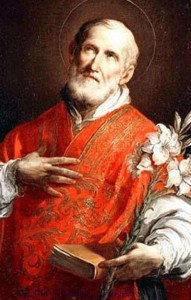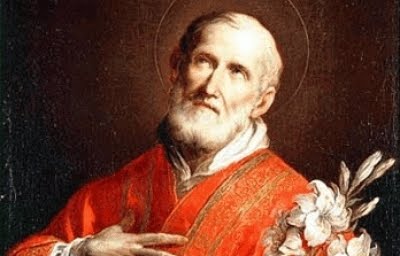Today we continue our regular series called “Learning from the Saints.” Our guide is expert Bert Ghezzi, a dear friend of mine and the author of numerous books including Voices of the Saints, Saints at Heart, and Discover Christ: Developing a Personal Relationship with Jesus.
His newest book is The Saints Devotional Bible, which illuminates the Scriptures with the saints’ own reflections. You can learn more about Bert and his work at BertGhezzi.com.
Today, Bert profiles St. Philip Neri, the sixteenth-century patron of humor, joy, and laughter and a possible patron for the New Evangelization.
 For forty-five years St. Philip Neri evangelized thousands of people at Rome, from the poor to the popes. He buttonholed them in life-changing conversations, instructed them in conferences, attracted them with beautiful music, and mainly drew them to conversion in the confessional. Philip won their hearts with his consistent kindness and jovial sense of humor.
For forty-five years St. Philip Neri evangelized thousands of people at Rome, from the poor to the popes. He buttonholed them in life-changing conversations, instructed them in conferences, attracted them with beautiful music, and mainly drew them to conversion in the confessional. Philip won their hearts with his consistent kindness and jovial sense of humor.
He became known as the “Second Apostle of Rome” because his ministry promoted a general return to the apostolic life. He is an ideal patron saint for the new ardor, new methods, and new expressions of the New Evangelization. You can get a feel for the saint’s attractiveness in his maxims, like these:
“He who wishes to pray without mortifying himself is like a bird trying to fly before it has grown its feathers.”
“The best preparation for prayer is to read the lives of the saints, not from mere curiosity, but quietly and with recollection a little at a time. And to pause whenever you feel your heart touched with devotion.”
“Imagine yourselves to be spiritual beggars in the presence of God and his saints. You should go round from saint to saint, imploring an alms with the same real earnestness with which the poor beg.”
“He who does not go down to hell in his lifetime, runs a great risk of going there when he dies.”
“In all other temptations, he who fights overcomes. But against lust, he overcomes who runs away.”
“The worst tribulation of the true servant of God is to be without tribulation.”
“Never try to evade the cross that God sends you, for you will only find a heavier one.”
“Very often the fault we commit by too great sadness when we are rebuked is greater than the fault which drew on us the rebuke.”
“Shun evil company. Don’t nourish the body too daintily. Abhor idleness. Pray much. Frequent the sacraments, especially confession.”
In 1533, after a dramatic personal experience of God, Philip migrated to Rome, where he lived in poverty. After several years of solitude and study, he sold his books and hit the streets to do the apostolic work of leading people to Christ. Ordained in 1551, he went to live with a community of priests at San Giralomo. He and his associates held conferences in their oratory that gathered people for an evening of study and prayer that climaxed in music or a short pilgrimage to one of the ancient basilicas.
Soon Philip gathered about himself a small group of talented priests that he organized into the Congregation of the Oratory. Philip’s informality characterized the foundation. For example, members were not required to take vows, but only to adhere to the gospel. “If you want to be obeyed,” quipped Philip, “don’t make commandments.” Officially recognized in 1575, the Oratory spread throughout the world and attracted illustrious members such as Bl. John Henry Newman.
Like his contemporary St. Teresa of Avila, Philip Neri was a mystic-in-action. He reported that once at prayer in 1544 he saw a globe of fire enter his mouth and set his heart aflame that permanently afflicted him. The saint did his best to hide his mystical phenomena, but sometimes his ecstasies at Mass lasted so long that the acolytes could leave for an hour’s break.
In 1595, St. Philip Neri saved Rome from France’s fury by persuading the Pope to pardon King Henry IV. He died on May 25 in that year, active till the end and celebrated as the most popular person in Rome.
“Cast yourself with confidence into the arms of God. And be very sure of this, that if he wants anything of you he will fit you for your work and give you strength to do it.”
— St. Philip Neri
Adapted from Bert Ghezzi, Voices of the Saints (Loyola Press, 2009).
(Image Credit: La Nuova Regaldi)
Read more from Bert at his website www.BertGhezzi.com, or check out his many books on Amazon.
 |
 |
 |
 |


